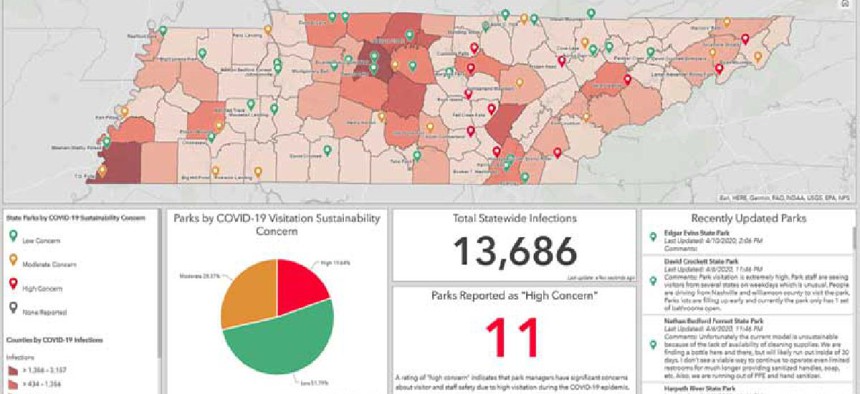Connecting state and local government leaders
Staff at Tennessee State Parks built GIS apps to assess risk to visitors and staff, keep the governor’s office informed and alert the public to changes in parks’ status.
When COVID-19 stay-at-home orders first began to pop up in Tennessee, the state's parks saw a sudden increase in visitors. People believed that outdoor recreation at a safe social distance would be a healthy away-from-home option, and so they set out to visit the state's many parks.
Alarmed by the huge number of local and out-of-state guests visiting during that first week, park managers grew concerned about potential health risks for visitors and staff. Tennessee Gov. Bill Lee quickly responded by closing the state's 56 parks. Officials were uncertain of when and how to safely reopen them.
Staff at Tennessee State Parks needed a way to help the governor's office monitor the COVID-19 crisis, make policy and create guidelines. Moreover, they needed a system that would help park managers plan reopening strategies and keep the public up-to-date about which parks are open and what restrictions are in place.
Since location plays a crucial role in COVID-19 safety and prevention, state leaders decided to use GIS to monitor and manage the crisis. For years, Tennessee State Parks had been using the technology, keeping up with location intelligence advancements and developing applications for managing park and business operations, so it was not a stretch to create a GIS strategy specifically designed to handle the pandemic.
Managing information essentials
Rachel Schultz, parks and conservation GIS lead, and a team at the Tennessee Department of Environment and Conservation created a location strategy that would help leaders launch safe initiatives. First on the to-do list was to determine each park's risk factors and levels. Next was to create a dashboard that would give the governor's office actionable information that would be updated throughout the day as needed.
"Previous park closures were due to budgetary and economic concerns," Schultz said. "These current and partial closures are caused entirely by public health concerns. It's a new arena for us, as I believe it is for many organizations."
Simultaneously, the GIS team expanded park staff's technology capacity, developing apps and analysis to provide decision-makers with the location intelligence they needed. The team used a variety of data to support these tools, including existing information on parks, COVID-19 tracking data from the state health department and modeling output data from the Institute for Health Metrics Evaluation. But the most valuable data came from the parks themselves, especially real-time information captured by park managers and rangers using GIS mobile apps for data collection.
Analyzing risk
Risk analysis played a large role in understanding and managing response for state parks. To determine COVID-19 risk levels for each park, the GIS team created a web survey app to collect information from park managers. It asked them to rate their concern levels about continuing regular operations during the outbreak as low, moderate or high. The survey also asked what specific situations were driving those concerns.
The team built an operations dashboard that showed the spatial distribution of parks with high concerns. It also used geographically weighted regression tools to find patterns that explained why some parks were more or less concerned with risk than others. Findings showed the highest concerns came from parks with rugged or steep terrains in which park rangers would be exposed to COVID-19 during rescues. Also, parks that had sufficient stocks of personal protective equipment and cleaning supplies were more likely to give a low or moderate concern rating.
Deciding when to reopen
Staff used a GIS park sustainability dashboard to brief the governor on the status of Tennessee State Parks, which allowed him to work on pandemic response including the difficult decision to temporarily close state parks.
During the closure, the team completed two more GIS projects. The first one tracked PPE and cleaning supply inventory at parks across the state. It helped management determine how best to distribute equipment and supplies among state parks. A dashboard measured status of the goal of getting each park fully stocked with everything staff needed to feel secure upon reopening.
Within the parks, staff posted signage about closed trails, social distancing rules and face mask requirements.
Informing the public
Tennessee State Parks wanted to supply people with information that would be easier to read than a simple list. The GIS team lead worked closely with the park's marketing team to embed a web app at TNStateParks.com. They built a publicly accessible, interactive map that interfaced with the GIS database.
Whenever a park's status changes, the map automatically updates and shows the most current information. If a park experiences an unsustainably high amount of visitation over a weekend, the park can close or restrict admission and immediately show it on the public map.
A tenet of social distancing is to stay close to home. Although Tennessee encourages people to come out and enjoy state parks, it asks visitors to limit travel as much as possible. Fortunately, all Tennesseans can find a state park within a one-hour drive. The status map will quickly and clearly show the nearest park and its current status and restrictions.
"We have never experienced anything like this," Schultz said. "GIS helps us to respond to these new and ever-evolving situations quickly and efficiently."



